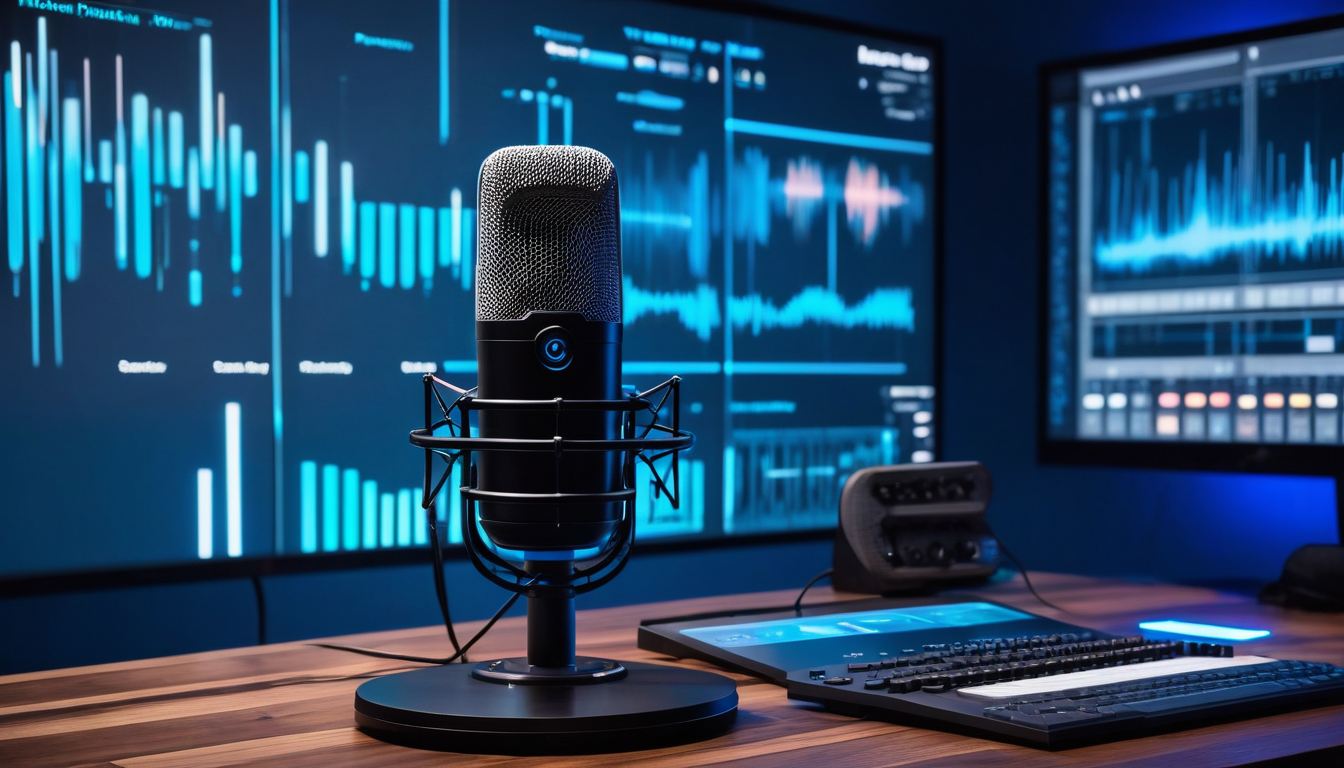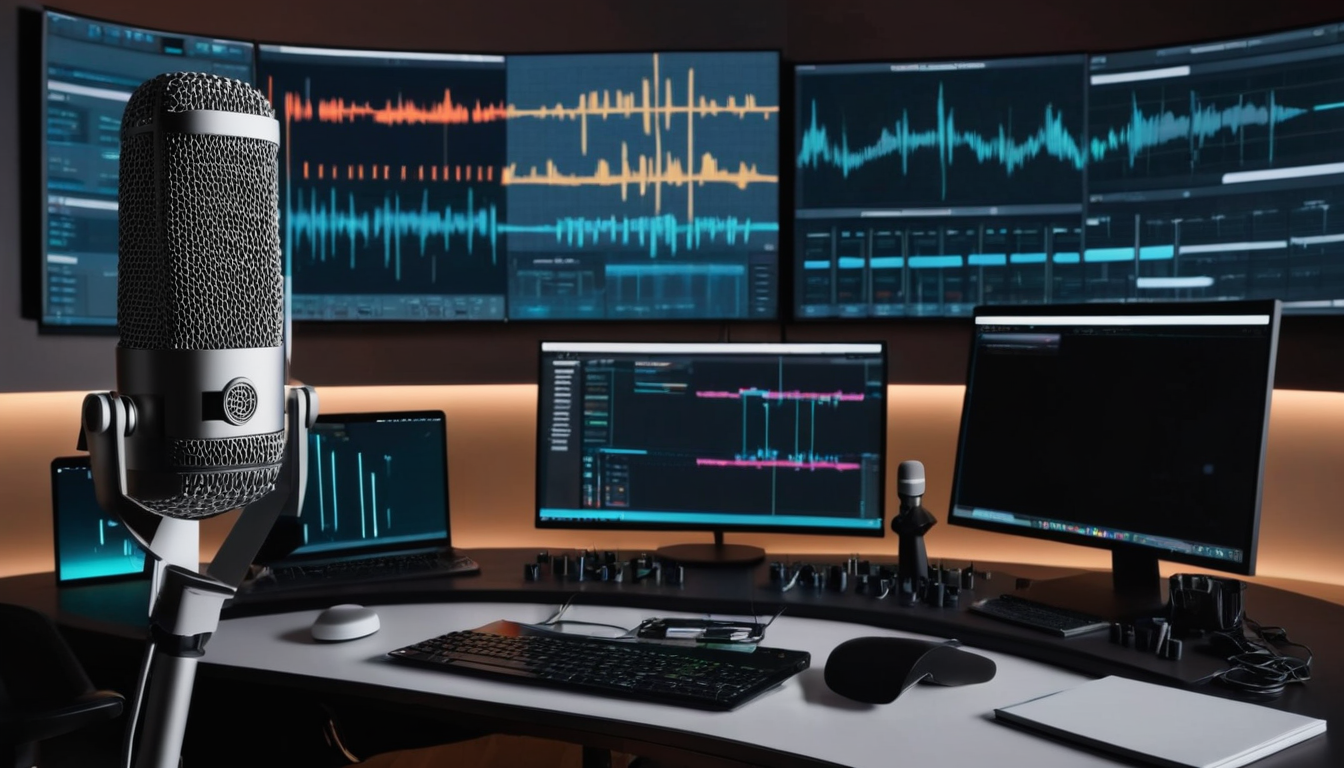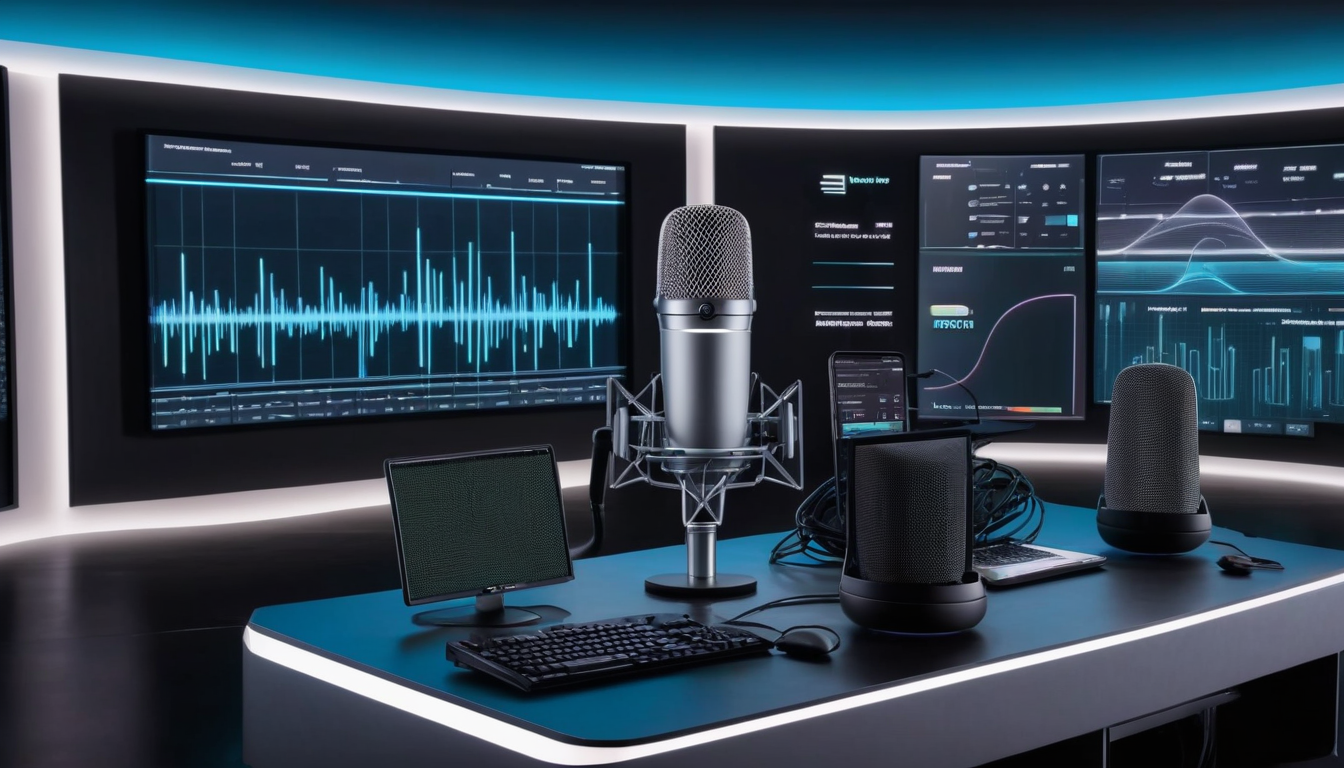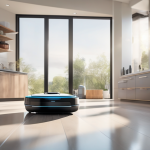Can AI Replace Human Podcasters? The Future of AI-Generated Podcasts

The world of podcasting is evolving at an unprecedented pace, and with the rise of artificial intelligence (AI), a burning question emerges: Can AI replace human podcasters? As we explore this fascinating topic, it’s essential to understand both the capabilities of AI and the unique qualities that human hosts bring to the table. The landscape of audio content creation is shifting, and the implications for creators and listeners alike are significant. Imagine a future where your favorite podcast is produced by a machine—sounds intriguing, right? But what does that mean for the authenticity and emotional connection that we cherish in storytelling?
AI technology has made remarkable strides in recent years, enabling it to generate content that rivals human creativity in some respects. However, while AI can churn out episodes at lightning speed, the question remains: Can it truly capture the essence of what makes a podcast engaging? To answer this, we must dive into the advantages and challenges that AI-generated podcasts present.
AI’s integration into content creation has opened up new possibilities. From automated editing tools to sophisticated algorithms that analyze listener preferences, the potential for AI in podcasting is vast. A recent survey revealed that 70% of content creators are exploring AI tools to enhance their workflow. This shift is not just a trend; it’s a revolution that could redefine how we consume audio content.
| AI Capabilities | Human Podcaster Qualities |
|---|---|
| Speed of Content Production | Emotional Resonance |
| Cost Efficiency | Unique Storytelling |
| Data Analysis for Tailored Content | Personal Connection with Audience |
As we move forward, it’s crucial to weigh the benefits against the limitations. While AI can produce content rapidly and at a lower cost, the emotional depth and creativity inherent to human storytelling are irreplaceable. Think of it this way: AI might be able to write a song, but can it truly feel the heartache behind the lyrics? That’s where the human touch remains indispensable.
In conclusion, the future of AI-generated podcasts is both exciting and complex. As we embrace these technological advancements, we must also consider the ethical implications and the irreplaceable qualities that human podcasters bring to the table. So, can AI replace human podcasters? Perhaps it can complement them, but the heart of podcasting—its storytelling and emotional engagement—will always need a human touch.

The Rise of AI in Content Creation
The emergence of AI technology has revolutionized the landscape of content creation, particularly in the realm of podcasting. As we leap into an age where machines can learn and adapt, it’s fascinating to see how these advancements are reshaping our audio experiences. Imagine a world where your favorite podcast could be produced in a fraction of the time, with minimal costs, and still deliver captivating content. Sounds like a dream, right? Well, it’s becoming a reality!
AI has made significant strides in various fields, and podcasting is no exception. From automated voice generation to intelligent editing tools, the capabilities of AI are expanding rapidly. Here’s a quick overview of how AI is influencing content creation:
| AI Capability | Description |
|---|---|
| Voice Synthesis | AI can create realistic human-like voices for narration. |
| Content Generation | AI can generate scripts based on topics and keywords. |
| Editing Automation | AI tools can edit audio files, removing silence and errors. |
The integration of AI into podcast production not only enhances efficiency but also opens doors to new possibilities. For instance, podcasters can now focus on what truly matters: creating engaging content. With AI handling the technical aspects, creators can unleash their creativity without being bogged down by mundane tasks.
But how did we get here? The journey of AI in content creation began with simple algorithms and has evolved into sophisticated systems capable of understanding context and nuance. This evolution raises some intriguing questions:
- Will AI-generated podcasts resonate with audiences as much as those produced by humans?
- Can AI replicate the emotional depth and creativity of human storytellers?
As we navigate through this exciting terrain, it’s essential to consider both the potential and the limitations of AI in podcasting. While the technology is promising, it’s crucial to maintain a balance between innovation and the human touch that makes storytelling so special.
In conclusion, the rise of AI in content creation is not just a trend; it’s a transformative force that is redefining how we think about podcasts. As we embrace this change, we must also ponder the future of audio content and the role of human creators in an increasingly automated world.

Benefits of AI-Generated Podcasts
AI-generated podcasts are not just a passing trend; they represent a revolution in the audio content landscape. With the rapid advancements in technology, creators are discovering a plethora of benefits that AI brings to the table. Imagine being able to produce high-quality content at lightning speed, all while slashing costs. Sounds like a dream, right? Well, it’s becoming a reality!
One of the most significant advantages of AI in podcasting is its cost efficiency. Traditional podcast production can be expensive, involving costs for equipment, editing software, and sometimes even hiring professionals. However, AI tools can streamline this process, allowing creators to produce episodes without breaking the bank. For instance, a recent study by Podcaster Insights revealed that creators using AI tools saved an average of 30% on production costs. This means more funds can be allocated to marketing or enhancing content quality.
| Traditional Podcasting Costs | AI-Generated Podcasting Costs |
|---|---|
| Equipment: $500+ | AI Tools: $50-$200/month |
| Editing Services: $100/episode | Automated Editing: $20/episode |
Another standout benefit of AI-generated podcasts is time savings. We all know that time is money, and AI can significantly reduce the hours spent on editing and production. Imagine spending less time wrestling with audio files and more time brainstorming your next great episode idea! With automation handling the technical aspects, podcasters can focus on what they do best—creating engaging content.
Moreover, AI allows for scalability. For podcasters looking to expand their reach, AI can facilitate the production of multiple episodes simultaneously without compromising quality. This capability is particularly beneficial for those who want to tap into various niches or experiment with different formats. The ability to scale can mean the difference between a small podcast and a thriving media brand.
In conclusion, the benefits of AI-generated podcasts are clear: cost efficiency, time savings, and scalability. As technology continues to evolve, embracing AI could be the key to staying competitive in the ever-growing podcasting arena. Are you ready to join the AI podcasting revolution?
Cost Efficiency
One of the primary advantages of AI-generated podcasts is their remarkable . Imagine being able to produce high-quality content without breaking the bank! Traditional podcasting often involves significant expenses, such as hiring sound engineers, editors, and even voice talent. With AI stepping into the picture, these costs can be slashed dramatically. By automating various aspects of the production process, creators can focus their budgets on what truly matters—creating engaging content.
For instance, AI tools can handle tasks like audio editing, sound mixing, and even script generation, which traditionally require a lot of human labor. This reduction in labor costs leads to increased profitability for podcasters. A recent study showed that podcasters using AI tools reported a 30% reduction in production costs. Here’s a quick breakdown:
| Traditional Costs | AI-Enhanced Costs | Cost Savings |
|---|---|---|
| Editing Services | Automated Editing Tools | $300 vs. $100 |
| Sound Engineering | AI Sound Mixing | $400 vs. $50 |
| Voice Talent | AI Voice Generation | $500 vs. $0 |
In addition to cost savings, AI-generated podcasts offer scalability that traditional methods simply can’t match. Podcasters can produce multiple episodes in a fraction of the time, which means more content for listeners and more opportunities for monetization. This is especially beneficial for creators looking to expand their reach without the added financial burden.
However, while the of AI is a significant draw, it’s essential to consider the quality of content produced. Can AI truly match the creativity and personal touch of human podcasters? That’s a question worth exploring as we dive deeper into the realm of AI in podcasting.
Time Savings
In the fast-paced world of podcasting, can be a game changer. Imagine being able to produce high-quality episodes without spending countless hours on editing and production. With AI, this dream is becoming a reality. By automating various aspects of the podcast creation process, AI allows creators to focus on what really matters: crafting engaging content that resonates with their audience.
For instance, traditional podcast production can involve multiple steps, including recording, editing, and mixing. Each of these steps can take hours, if not days, to perfect. However, AI tools can streamline these processes significantly. Here’s how:
| Traditional Process | AI-Enhanced Process |
|---|---|
| Recording | Automated audio enhancements during recording |
| Editing | Instant editing suggestions and corrections |
| Mixing | Smart mixing algorithms for optimal sound |
Thanks to these advancements, podcasters can reduce their production time by as much as 50% or more. This not only means more episodes can be released in less time, but it also opens up opportunities for podcasters to explore new ideas and themes without the constant pressure of tight deadlines.
Moreover, the automation of repetitive tasks allows podcasters to spend more time on creative endeavors. Instead of getting bogged down in technical details, they can brainstorm new topics, conduct interviews, or engage with their audience. In essence, AI acts as a silent partner, handling the nitty-gritty so that creators can shine.
As we look to the future of podcasting, the question arises: How will this shift impact the industry? Will we see a new wave of creativity fueled by the extra time on creators’ hands? Or will the reliance on AI lead to a homogenization of content? Only time will tell, but one thing is for sure—AI is here to stay, and it’s changing the game for podcasters everywhere.
“Time is what we want most, but what we use worst.” – William Penn
Scalability
In the ever-evolving world of podcasting, is a game-changer. Imagine being able to produce multiple episodes at once, reaching a broader audience without sacrificing quality. That’s where AI comes into play. With its advanced algorithms and processing power, AI can help podcasters generate content at an unprecedented scale. This capability not only enhances productivity but also allows creators to experiment with various formats and styles.
For instance, a single AI system can manage the production of different podcast series simultaneously. This means that while one series is being recorded, another can be edited, and yet another can be published—all in real-time. Think of it like a well-oiled machine, where every cog works harmoniously to keep the content flowing. Here’s a quick overview of how AI contributes to scalability:
| AI Contribution | Benefit |
|---|---|
| Automated Editing | Speeds up the post-production process |
| Content Generation | Creates scripts and outlines for multiple episodes |
| Voice Synthesis | Enables the creation of unique audio for different shows |
Moreover, AI tools can analyze listener data to determine which topics are trending or what content resonates best with the audience. This insight allows podcasters to tailor their output, ensuring they stay relevant and engaging. But how does this all translate into real-world application? Here are a few ways podcasters can leverage AI for scalability:
- Batch Production: Create multiple episodes in one sitting.
- Dynamic Content: Adjust themes and topics based on analytics.
- Resource Optimization: Allocate human resources to more creative tasks while AI handles repetitive processes.
In summary, the scalability offered by AI is not just about producing more content; it’s about enhancing the overall podcasting experience. With AI, creators can focus on what they do best—engaging storytelling—while the technology takes care of the rest. As we look to the future of AI-generated podcasts, the potential for growth and innovation is limitless.
Quality of Content
When it comes to podcasting, the is paramount. While AI can churn out episodes at lightning speed, the big question remains: can it maintain the engaging storytelling and unique perspectives that human podcasters bring to the table? It’s like comparing a beautifully crafted painting to a mass-produced print; one has soul, while the other is simply a reproduction.
AI-generated podcasts can certainly produce informative and structured content, but they often lack the nuance and emotional depth that resonate with listeners. For instance, AI can analyze trends and create scripts based on popular topics, but can it truly capture the essence of human experience? This is where the challenge lies. To illustrate this point, consider the following table:
| Aspect | AI-Generated Podcasts | Human-Produced Podcasts |
|---|---|---|
| Creativity | Limited to algorithms | Unique storytelling |
| Emotional Engagement | Minimal | High |
| Personal Touch | Absent | Present |
While AI can analyze data and generate content that is factually accurate, it often misses the mark on delivering authenticity. Many listeners crave a personal connection, a sense of familiarity that comes from hearing a human voice share real-life experiences. This emotional connection fosters loyalty and keeps audiences coming back for more.
Moreover, the quality of AI-generated content can vary significantly. Some AI tools are designed to mimic human speech and intonation, while others may produce robotic-sounding audio that fails to engage the listener. Here are some key factors that influence the quality:
- Script Quality: The depth and originality of the script can make or break a podcast.
- Voice Synthesis: The naturalness of the AI voice can affect listener engagement.
- Editing Precision: How well the final product is polished plays a crucial role.
In summary, while AI has made significant strides in podcast production, the generated by AI still faces scrutiny. The challenge lies in balancing efficiency with the rich, emotional storytelling that defines great podcasting. As technology continues to evolve, it will be fascinating to see how AI can potentially enhance, rather than replace, the human touch in this beloved medium.

Challenges and Limitations of AI in Podcasting
While the rise of AI in podcasting brings a wave of excitement, it also comes with its fair share of challenges and limitations. One of the most pressing concerns is the lack of creativity. Can a machine truly replicate the unique storytelling that human podcasters bring to the table? This question lingers in the minds of many, as creativity is often seen as an inherently human trait. AI can analyze data and generate content based on patterns, but can it craft a compelling narrative that resonates with listeners on a personal level?
Moreover, another significant hurdle is the emotional connection that human hosts establish with their audience. Podcasting is not just about sharing information; it’s about creating a bond. Listeners often tune in for the warmth of a familiar voice or the relatable experiences shared by their favorite podcasters. AI, despite its advancements, struggles to convey genuine emotion and empathy. This lack of emotional depth could lead to a disconnect between AI-generated content and the audience, ultimately affecting engagement.
| Challenges | Implications |
|---|---|
| Lack of Creativity | Potentially less engaging content |
| Emotional Connection | Reduced listener loyalty and engagement |
| Quality Control | Inconsistent output quality |
As we navigate through these challenges, it’s essential to consider the implications they hold for the future of podcasting. Will audiences embrace AI-generated content, or will they always prefer the human touch? The answer might lie in how creators choose to blend AI capabilities with their unique voices. For instance, AI could assist in research and editing, while the human element remains at the forefront of storytelling.
In conclusion, while AI holds immense potential in transforming the podcasting landscape, it must overcome significant hurdles to truly replace human podcasters. The balance between leveraging technology and maintaining the essence of human connection will be crucial as we move forward. So, is AI the future of podcasting? Only time will tell, but one thing is for sure: the journey will be as fascinating as the stories we share.
Creativity Concerns
The advent of AI in podcasting has sparked a heated debate about its ability to generate truly creative content. While AI can analyze vast amounts of data and produce scripts based on patterns, the question remains: can it replicate the unique storytelling that human podcasters bring to the table? Creativity is not merely about stringing words together; it’s about invoking emotions, crafting narratives, and connecting with listeners on a personal level. This is where AI often falls short.
To illustrate the difference, consider the following table that compares the creative capabilities of AI and human podcasters:
| Aspect | AI Podcasters | Human Podcasters |
|---|---|---|
| Storytelling | Data-driven narratives | Personal anecdotes and emotional depth |
| Originality | Pattern recognition | Unique perspectives and experiences |
| Engagement | Limited emotional connection | Strong listener relationships |
As we can see, while AI can produce content at an impressive rate, it often lacks the emotional resonance that human hosts naturally convey. Listeners are not just tuning in for information; they crave connection and authenticity. This brings us to the heart of the creativity concerns: can an algorithm truly understand the nuances of human experience? The answer is still murky.
Moreover, AI-generated content can sometimes feel formulaic and repetitive. It might excel in creating structured outlines or summarizing topics, but it struggles with the spontaneous creativity that often leads to memorable podcast moments. For instance, when a host shares a personal story that resonates with listeners, it creates a bond that a machine simply cannot replicate. This leads to an important question for the future of podcasting: will audiences choose the warmth of human storytelling over the efficiency of AI?
In conclusion, while AI has the potential to revolutionize podcast production, its ability to generate genuinely creative content remains a significant concern. As we navigate this evolving landscape, it is crucial to consider how we can harness AI’s strengths while preserving the unique qualities that make podcasting such a beloved medium.
Emotional Connection
The emotional connection between a podcast host and their audience is like the thread that weaves a tapestry of shared experiences. It’s what makes listeners feel like they are part of a conversation rather than just passive observers. While AI can generate content with impressive speed and efficiency, it often lacks the human touch that fosters genuine emotional bonds. Can a machine truly understand the nuances of human emotion? This question looms large as we navigate the future of AI-generated podcasts.
When we listen to our favorite podcasters, we often feel a sense of camaraderie. Their stories resonate with our own experiences, and their laughter or vulnerability can evoke feelings of joy or empathy. In contrast, AI-generated podcasts may deliver information or even mimic human speech patterns, but can they replicate the spontaneity and authenticity that humans bring to the table? The answer is still up for debate.
Consider the following aspects of emotional connection in podcasting:
- Storytelling: Human podcasters often share personal anecdotes that create relatability and warmth.
- Vocal Tone: The way a host’s voice rises and falls can evoke emotions that AI may struggle to replicate.
- Spontaneity: A human’s ability to improvise and react to unexpected moments adds a layer of authenticity.
As we explore the emotional landscape of podcasting, it’s important to acknowledge the limitations of AI. While it can analyze data trends and generate scripts, it lacks the lived experiences that form the backbone of compelling storytelling. Moreover, the emotional depth that comes from genuine human interactions is something that AI is yet to master.
In a recent study, listeners expressed their preferences regarding emotional engagement in podcasts. The findings revealed that:
| Listener Preference | Human Hosts (%) | AI Hosts (%) |
|---|---|---|
| Strong Emotional Connection | 78% | 22% |
| Informative Content | 55% | 45% |
| Entertainment Value | 65% | 35% |
This data highlights a clear preference for human hosts when it comes to emotional engagement. As we move forward, the challenge for AI will be to bridge this gap and find ways to connect with audiences on a deeper level. Will AI ever be able to evoke the same emotional responses as a human host? Only time will tell, but for now, the heart of podcasting remains firmly in human hands.

Audience Reception of AI-Generated Podcasts
The reception of AI-generated podcasts among listeners is a fascinating topic that combines technology with human emotions. As AI continues to evolve, many people are curious about how these digital creations stack up against traditional human-hosted podcasts. Do listeners embrace the convenience and novelty of AI-generated content, or do they prefer the warmth and authenticity of human voices? Understanding these preferences is crucial for podcasters as they navigate this new landscape.
Recent surveys indicate a mixed reception. While some listeners appreciate the innovative aspects of AI-generated podcasts, others are skeptical about their ability to engage audiences on a personal level. For instance, a survey conducted by Podcast Insights revealed that:
| Listener Preference | Percentage |
|---|---|
| Prefer AI-generated podcasts | 30% |
| Prefer human-hosted podcasts | 60% |
| No preference | 10% |
This data illustrates a clear trend: a significant majority still lean towards human-hosted content. But what drives this preference? Many listeners feel that human hosts bring a unique flavor to their storytelling, weaving in personal anecdotes and emotional depth that AI simply cannot replicate. As one listener put it, “AI can churn out information, but it lacks the soul that makes a podcast truly resonate.”
Despite these challenges, AI-generated podcasts are finding their niche. They often cater to specific audiences, such as those seeking quick news updates or niche topics where rapid content generation is beneficial. The ability to produce episodes at a faster rate can be a game-changer for busy listeners who crave timely information.
Moreover, as AI technology continues to improve, we might see a shift in audience reception. The potential for AI to learn and adapt based on listener feedback could lead to more personalized content, bridging the gap between automation and emotional connection. It’s an exciting time in the podcasting world, and the evolving relationship between AI and human creators will undoubtedly shape the future of audio content.
In conclusion, the audience reception of AI-generated podcasts is a complex interplay of preference, emotion, and innovation. As creators explore this new frontier, they must consider not only the technological advantages but also the emotional connections that keep listeners coming back for more.
Listener Preferences
The landscape of podcasting is as diverse as its audience, and understanding is crucial for both human and AI-generated content. As we dive into this topic, it’s essential to recognize that every listener has unique tastes and expectations. Some may prefer the warmth and authenticity of a human voice, while others might be intrigued by the precision and novelty of AI-generated podcasts. This dichotomy raises questions about what truly resonates with audiences.
Research shows that listeners often gravitate towards content that feels relatable and engaging. A recent survey indicated that 60% of podcast enthusiasts prefer shows hosted by real people, valuing the emotional connection and storytelling prowess that human hosts bring. However, there’s a growing curiosity about AI-generated podcasts, especially among tech-savvy audiences. Here’s a breakdown of listener preferences:
| Listener Preference | Percentage |
|---|---|
| Human Hosts | 60% |
| AI-Generated Content | 25% |
| Mixed Format (Human + AI) | 15% |
Interestingly, many listeners express a desire for a hybrid approach, where human hosts collaborate with AI to enhance content quality. This blended format could potentially offer the best of both worlds, combining emotional depth with the efficiency of AI. Listeners appreciate the creativity that human hosts bring, but they are also intrigued by the innovative capabilities of AI in generating fresh ideas and insights.
In conclusion, while AI-generated podcasts are making waves, the majority of listeners still lean towards human hosts for their emotional resonance and storytelling abilities. As the podcasting industry evolves, it will be fascinating to see how these preferences shape the future of content creation. Will AI be able to bridge the gap and create a connection similar to that of a human host? Only time will tell!
Ethical Considerations
The emergence of AI-generated podcasts brings forth a plethora of that demand our attention. As we embrace this technology, we must ponder questions surrounding originality, authorship, and the potential implications for human creators. After all, can a machine truly own the content it produces, or does it merely reflect the creativity of its programmers?
One of the most pressing ethical dilemmas is the issue of originality. AI systems, while capable of generating content at an impressive rate, often rely on existing works to learn and create. This raises concerns about whether the output can be considered original or if it is merely a rehash of previously published material. In a world where copyright infringement is a serious offense, how do we navigate the murky waters of AI-generated content?
Additionally, the question of authorship looms large. If an AI creates a podcast episode, who is the rightful owner of that content? Is it the programmer, the user who initiated the AI, or the AI itself? This ambiguity could lead to significant legal challenges and a reevaluation of copyright laws as they pertain to AI-generated works.
Moreover, the impact of AI on human creators cannot be overlooked. As AI becomes more prevalent in podcasting, will it diminish the opportunities for human podcasters, or will it coexist, enhancing the creative landscape? Here are some key ethical considerations to keep in mind:
- Impact on Employment: Will AI replace human podcasters, leading to job losses in the industry?
- Quality vs. Quantity: Can AI maintain the emotional depth and narrative quality that human podcasters bring to their content?
- Transparency: Should audiences be informed when they are listening to AI-generated content?
In conclusion, while the potential for AI in podcasting is exciting, we must tread carefully. The ethical implications of AI-generated podcasts are complex and multifaceted, requiring ongoing dialogue among content creators, audiences, and legal experts. As we forge ahead into this new frontier, we must ensure that we do not lose sight of the human touch that makes podcasting so unique.
| Ethical Consideration | Description |
|---|---|
| Originality | Concerns about whether AI-generated content is truly original or derivative. |
| Authorship | Questions about who owns the content created by AI. |
| Impact on Employment | Potential job losses for human creators as AI takes over content production. |
Frequently Asked Questions
- Can AI really replace human podcasters?
While AI has made significant strides in content creation, it lacks the unique storytelling abilities and emotional depth that human podcasters bring. AI can assist in production, but the personal touch of a human voice is irreplaceable.
- What are the benefits of AI-generated podcasts?
AI-generated podcasts offer cost efficiency and scalability. They can produce content at a faster rate, allowing creators to focus more on ideas and less on technical details. This means more episodes and potentially a wider audience reach!
- Are AI-generated podcasts of high quality?
Quality can vary, but AI has the potential to maintain or even enhance content quality through advanced editing and sound design. However, the creativity and emotional connection that human hosts provide are still critical for engaging listeners.
- What challenges does AI face in podcasting?
AI struggles with creativity and emotional connection. While it can generate content, it often lacks the nuanced understanding of human experiences that resonate with audiences, making it difficult to create truly engaging material.
- How do listeners feel about AI-generated podcasts?
Listener preferences vary widely. Some are open to AI-generated content, appreciating the efficiency and novelty, while others prefer the authenticity and relatability of human hosts. Audience reception is still evolving as AI technology advances.
- What are the ethical implications of AI in podcasting?
The rise of AI raises important questions about originality and authorship. As AI creates more content, concerns about intellectual property and the value of human creativity come to the forefront, prompting discussions about the future of creative industries.













